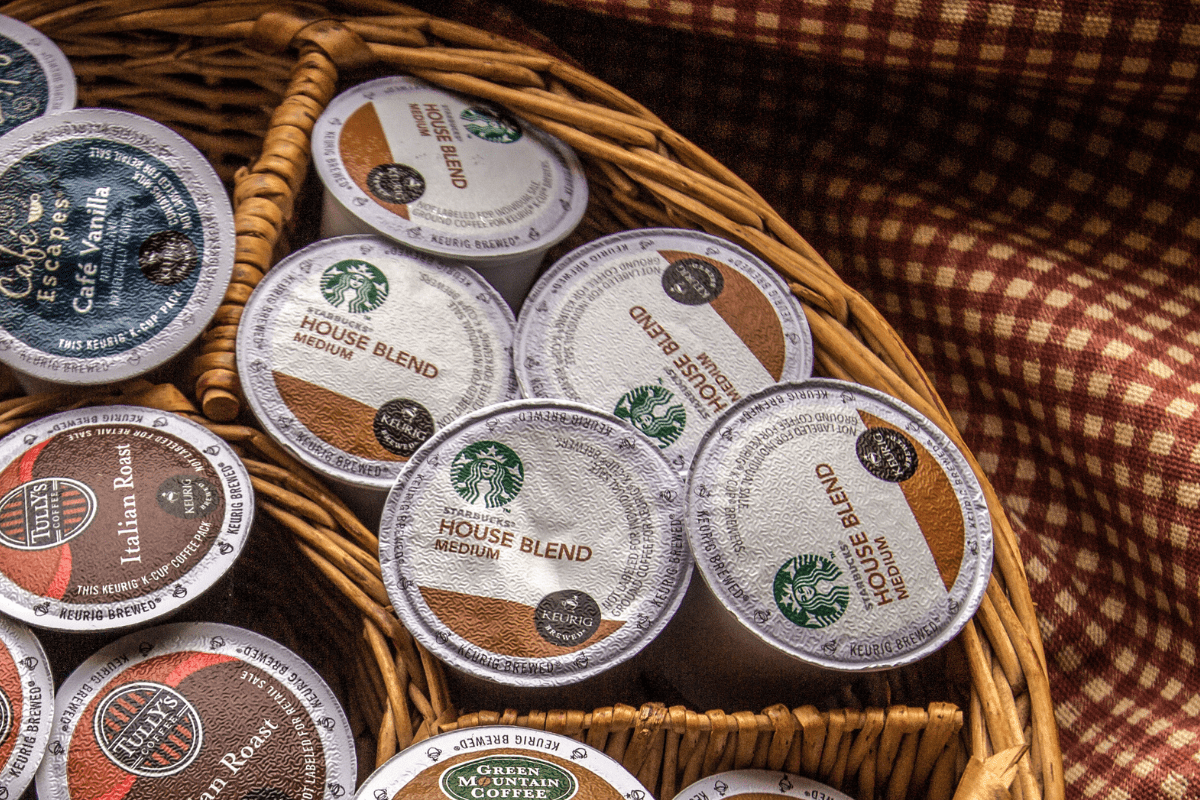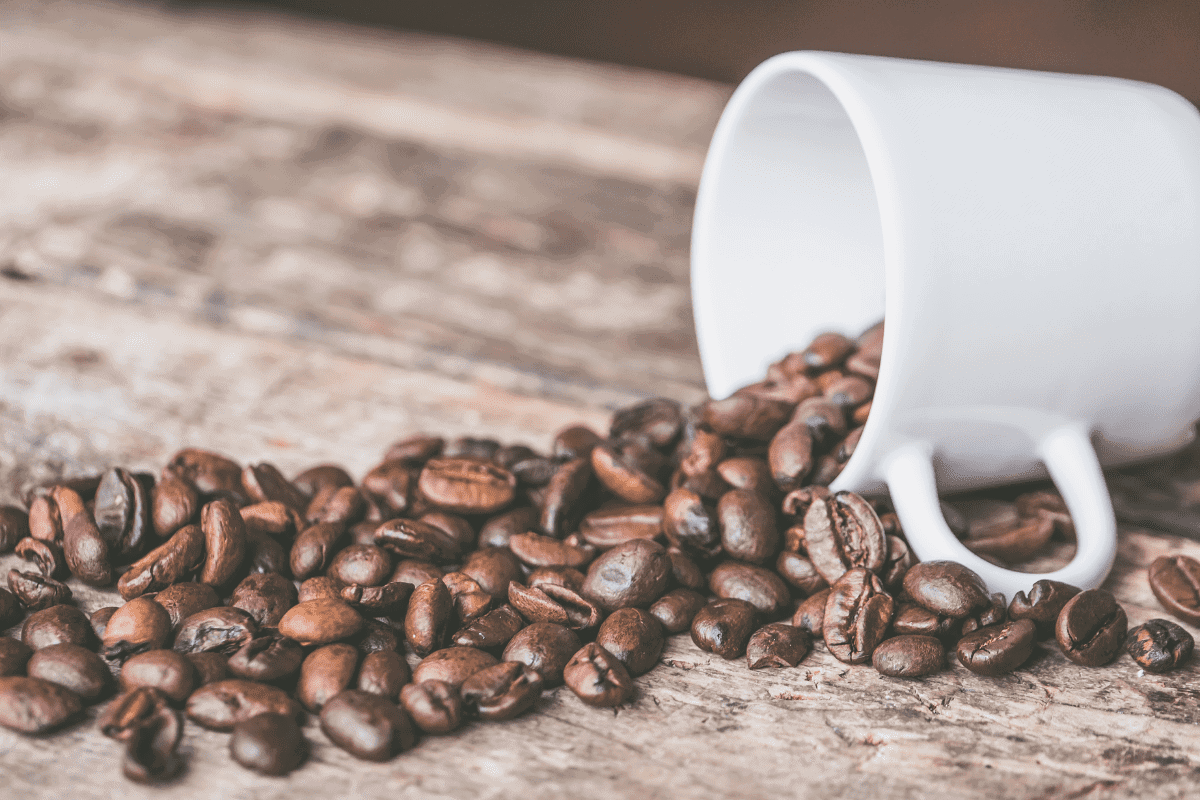K-Cups are so convenient that you want yours to last as long as possible. Is it better to keep them stored in your cabinet or should you refrigerate your K-Cups? Which will promote more longevity?
Keurig, the makers of K-Cup, discourage coffee lovers from refrigerating (or freezing) K-Cups to keep them fresh. Other aromas from the fridge become absorbed by the K-Cups, and they won’t taste as fresh or flavorful. Keep K-Cups in a dry, cool place instead.
If you have questions about keeping your K-Cups fresh, don’t worry, as we have the answers. Make sure you keep reading, so you don’t waste your K-Cups through improper storage!
What Happens If You Store K-Cups in the Fridge?
Coffee and the fridge have always had a rather complex relationship. You’re not supposed to keep whole or ground coffee beans in there.
Since a K-cup consists of a shot of already-brewed coffee, you might wonder what the harm is in putting a few of these convenient cups in the fridge until you need them.
If you care about the flavor of your K-cups, then there’s quite a lot of harm that can come from it.
You see, the reason you’re not supposed to store coffee beans in the fridge (unless you absolutely can’t help it) is that the deodorizing qualities of the beans will absorb all the other fridge aromas. The coffee won’t taste as good.
It’s much the same case with K-Cups. Keurig says that the K-Cup will still absorb the fridge smells even if the pod is sealed.
So let’s say you have strawberries in the fridge. Although strawberry can be a palatable flavor in some coffee contexts, if you have a dark roast coffee K-Cup, you probably won’t want any sweet notes of strawberry mingling in there.
Now imagine you’re storing tomatoes in the fridge. In no way, shape, or form are tomatoes and coffee complimentary; they just aren’t. Yet the K-Cups can still absorb the odors of the tomatoes and affect your cup of coffee.
It’s not just produce in your fridge, of course. Other items such as milk, orange juice, soda, thawing steak or chicken, eggs, butter…all these scents can get into your K-Cup.
The unparalleled flavor and scent of your K-Cup will be diluted. You’ll usually be able to tell as soon as you brew the pods, as certain aromatic notes will arise that aren’t there otherwise.
Even if you somehow don’t notice that something smells strange, you will undoubtedly be able to tell once you take a sip of your coffee.
The flavor probably won’t be so strong that you’ll be spitting the coffee out in the sink, but the alterations in taste won’t make for a palatable cup in the slightest.
Can You Freeze K-Cups?
Okay, so the fridge is out, but maybe you can store your K-Cups in the freezer instead? Perhaps you’ve even heard of a fellow coffee lover doing this and squeezing some extra time out of the pods.
As we mentioned in the intro, Keurig does not recommend keeping K-Cups in the freezer. According to them, the same issue that befalls K-Cups when you store the pods in the fridge can also happen in the freezer.
That means the nearby aromas of frozen foods can permeate the K-Cups, affecting both their flavor and their odor.
You might have seen guidance online recommending that you freeze your K-Cups. Is it really not feasible at all?
Theoretically, you could do it if and only if you kept nothing but K-Cups and ice packs in the freezer.
Remember, any other aroma, from frozen peas to frozen pizza, ice cream, and froyo, is going to get through to the pods and interrupt the way the K-Cup should smell and taste.
For many people, it’s not realistic to only use their freezer for K-Cups. Thus, you’re much better off skipping the freezer as a pod storage method just as you are the fridge.
Related Reading: Should I Freeze My Fresh Coffee Grounds?
Coffee Storage and K-Cups?
So if not the refrigerator and not the freezer either, where should you put your K-Cups, so they have an unfettered aroma and flavor?
That’s simple. You want to keep K-Cups in a cool dry place where the pods cannot be exposed to direct sunlight.
If you’ve ever kept coffee beans, whether whole or grounded, this recommendation should sound familiar to you. It’s the proper way to store coffee, too, after all.
Coffee has several enemies when storing it. Those are light, moisture, and oxygen.
When talking about light, it doesn’t exclusively have to mean sunlight. Your refrigerator has a light, and some freezer models do as well.
Exposure can influence the flavor and aroma if your K-Cups sit too close to the fridge or freezer light.
Sunlight is very detrimental to coffee as well. In both cases, the direct light exposure can kickstart the staling process.
Moisture or humidity is another big coffee enemy. The Equilibrium Relative Humidity or ERH of coffee begins to go up when the air outside of where the coffee is stored is cooler than the air inside.
In layman’s terms, the coffee is likelier to develop mold.
Finally, oxygen can wreck coffee, as it also accelerates the time it takes for the coffee to go stale.
That’s why you’re also supposed to keep coffee in an airtight container in addition to a cool, dark place such as a cabinet.
Since you buy K-Cups rather than whole or ground coffee beans, you’re already at an advantage. When sealed, a K-Cup is airtight, so moisture can’t get in, nor can oxygen.
That said, light can still penetrate the pod, so keep the K-Cups somewhere dark.
How Long do K-Cups Last? Do they Expire?
Technically, K-Cups do not have an expiration date, but they will start to grow stale after awhile. The packaging should have a “best by” date on them that will be a good indicator of how long they will retain their freshness and flavor.
The average lifespan of unopened K-Cups is 8-12 months.
Some coffee lovers jump to freezer storage for whole or ground coffee beans because the lifespan is not nearly as long.
Coffee stored in pods will last longer than your typical bag of coffee due to how they are packaged and sealed. First, the coffee is treated with liquid nitrogen that helps them retain their freshness. Then they are vacuum sealed in the pod so no light, moisture, or oxygen can enter.
Can You Store K-Cups in the Garage? What About the Basement?
All the talk about scents permeating through your K-Cups has you nervous about storing them in any other part of your home but your pantries.
That said, your pantries are full at the moment. You know better now than to put the K-Cups in the fridge or freezer, so you’re wondering if other parts of the home are viable.
For example, can you keep your K-Cups in your garage? What about your basement?
Let’s explore both storage options.
K-Cup Garage Storage
The garage is a place to keep many things, and depending on what’s in there, and the proximity to your K-Cups, storing the Keurig coffee pods near here may or may not be a wise idea.
If you want to store K-Cups in your garage, the best place is in a garage cabinet. We recommend moving other items away from the K-Cups that give off a smell.
K-Cup Basement Storage
As for storing K-Cups in the basement? We don’t recommend it.
Although the basement often feels chilly to you each time you go down there, it’s not cold all year long. The basement–especially if yours is uninsulated–is subject to whatever temperature changes are happening outside.
The basement will always be cooler on a hot summer day than standing out on your lawn, but it will still be warm.
In the winter, your basement will be freezing.
Due to these temperature fluctuations, despite the fact that the basement is otherwise dark, it’s not guaranteed cool. Your K-Cups could prematurely spoil.
Final Thoughts
K-Cups should not be refrigerated or frozen, as doing so can cause nearby food odors to permeate into the K-Cup and permanently influence the flavor and aroma.
Instead, the best place to keep K-Cups will always be in a cool, dark place away from moisture, sunlight, and air.
How Long Does Coffee Creamer Last?
While some coffee lovers enjoy their cup of coffee black with no additives, many of us, including myself, wouldn’t dare drink it without our favorite coffee creamers. Nowadays, there is…
Should Coffee Beans be Refrigerated?
Trying to keep your coffee beans fresher longer is a goal for most coffee lovers because fresh is always better. Not only will your cup of coffee taste better, but…


